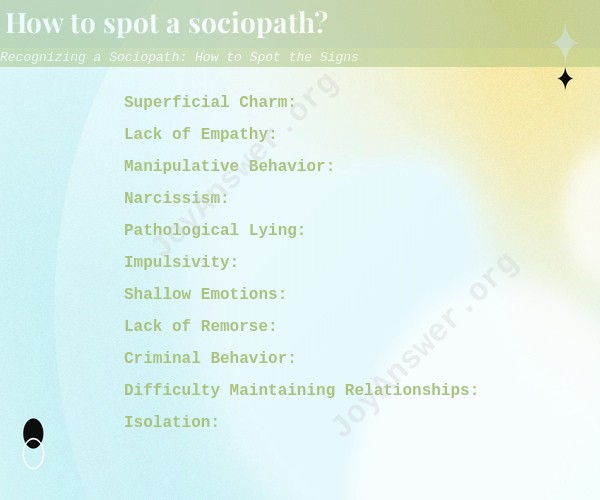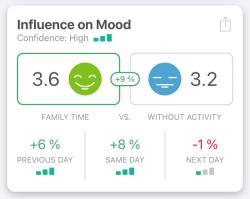How to spot a sociopath?
Identifying a sociopath can be challenging because they often have a charming and manipulative demeanor that conceals their true nature. Sociopathy is a complex personality disorder characterized by a lack of empathy, superficial charm, and a tendency to manipulate others for personal gain. Here are some common signs and behaviors that may help you spot a sociopath:
Superficial Charm: Sociopaths can be incredibly charming and charismatic. They often know how to charm and manipulate people to gain trust and control.
Lack of Empathy: One of the hallmark traits of sociopathy is a complete lack of empathy. They have difficulty understanding or caring about the emotions and well-being of others.
Manipulative Behavior: Sociopaths are skilled manipulators. They use deception, lies, and flattery to achieve their goals and manipulate others.
Narcissism: Many sociopaths have narcissistic traits and a grandiose sense of self-importance. They believe they are superior and entitled to special treatment.
Pathological Lying: Sociopaths often engage in pathological lying, creating elaborate stories and false personas to deceive others.
Impulsivity: They tend to act on impulse without considering the consequences of their actions. This can lead to risky and destructive behavior.
Shallow Emotions: Sociopaths may mimic emotions, but their feelings are typically shallow and short-lived. They lack the depth of emotional responses that most people experience.
Lack of Remorse: Sociopaths rarely feel remorse for their actions, even when they hurt or exploit others. They may rationalize their behavior or blame others.
Criminal Behavior: Some sociopaths engage in criminal activities, but not all do. Their behavior can range from white-collar crimes to violent offenses.
Difficulty Maintaining Relationships: Sociopaths often have tumultuous personal relationships characterized by manipulation, deceit, and instability.
Isolation: They may isolate themselves or push people away, as they have difficulty forming genuine emotional connections.
Pattern of Broken Promises: Sociopaths frequently make promises they have no intention of keeping, whether in personal or professional contexts.
Controlling Behavior: They may attempt to control others through intimidation, threats, or coercion.
It's important to note that not all individuals who exhibit some of these traits are sociopaths. Many people can have moments of manipulation, impulsivity, or superficial charm without meeting the criteria for sociopathy. A qualified mental health professional should diagnose and assess someone for a personality disorder like sociopathy.
If you suspect that someone you know may be a sociopath and their behavior is causing harm or distress, it's advisable to seek guidance from a mental health professional or counselor who can provide support and advice on how to manage the situation. Dealing with a sociopath can be challenging, and it's crucial to prioritize your own well-being and safety.
Identifying a Sociopath: Warning Signs and Characteristics
Sociopathy is a personality disorder characterized by a lack of empathy, remorse, and guilt. Sociopaths are often manipulative, deceitful, and impulsive. They may also have difficulty forming close relationships and may engage in risky or antisocial behaviors.
Here are some warning signs and characteristics that may indicate that someone is a sociopath:
- Lack of empathy: Sociopaths have difficulty understanding or caring about the feelings of others. They may be indifferent to the suffering of others or even enjoy causing harm.
- Remorselessness: Sociopaths do not feel remorse for their actions, even when they have caused harm to others. They may blame their victims or make excuses for their behavior.
- Grandiosity: Sociopaths often have an inflated sense of self-importance. They may believe that they are superior to others and that they are entitled to special treatment.
- Deceitfulness: Sociopaths are often liars and deceivers. They may manipulate others to get what they want or to avoid getting caught for their wrongdoing.
- Impulsiveness: Sociopaths may act impulsively without thinking about the consequences of their actions. They may engage in risky or antisocial behaviors, such as substance abuse, gambling, or promiscuity.
- Shallow emotions: Sociopaths may experience emotions, but their emotions are often shallow and fleeting. They may have difficulty forming deep attachments to others.
Sociopathic Behavior: How to Spot it in Individuals
Here are some examples of sociopathic behavior:
- Manipulating others to get what they want
- Lying and deceiving others
- Taking advantage of others
- Breaking the law
- Engaging in risky or antisocial behaviors
- Lacking empathy or remorse for their actions
It is important to note that not everyone who exhibits some of these behaviors is a sociopath. However, if someone consistently exhibits a pattern of sociopathic behavior, it may be a sign of a personality disorder.
Sociopathy Unmasked: Recognizing Traits of a Sociopath
If you are concerned that someone you know may be a sociopath, here are some tips for recognizing the traits of a sociopath:
- Pay attention to their behavior. Sociopaths often have a pattern of manipulative, deceitful, and impulsive behaviors.
- Observe their interactions with others. Sociopaths often have difficulty forming close relationships and may seem indifferent to the feelings of others.
- Listen to what they say. Sociopaths may make grandiose statements or make excuses for their behavior.
- Be wary of their charm. Sociopaths can be very charming and persuasive, but it is important to remember that their charm is often superficial.
If you believe that someone you know may be a sociopath, it is important to protect yourself from their manipulative and harmful behaviors. It is also important to seek professional help if you are struggling to cope with a relationship with a sociopath.
It is important to note that sociopathy is a complex condition and that there is no one-size-fits-all approach to diagnosis or treatment. If you are concerned that you or someone you know may be a sociopath, it is important to seek professional help.












